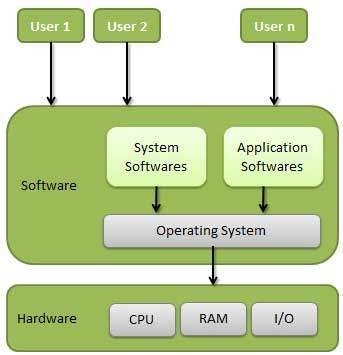An Operating System (OS) is an interface between a computer user and computer hardware. An operating system is a software which performs all the basic tasks like file management, memory management, process management, handling input and output, and controlling peripheral devices such as disk drives and printers.
Some popular Operating Systems include Linux Operating System, Windows Operating System, VMS, OS/400, AIX, z/OS, etc.
Time-sharing operating systems schedule tasks for efficient use of the system and may also include accounting software for cost allocation of processor time, mass storage, printing, and other resources.
For hardware functions such as input and output and memory allocation, the operating system acts as an intermediary between programs and the computer hardware, although the application code is usually executed directly by the hardware and frequently makes system calls to an OS function or is interrupted by it. Operating systems are found on many devices that contain a computer – from cellular phones and video game consoles to web servers and supercomputers.
The dominant desktop operating system is Microsoft Windows with a market share of around 82.74%. macOS by Apple Inc. is in second place (13.23%), and the varieties of Linux are collectively in third place (1.57%).[3] In the mobile (including smartphones and tablets) sector, Google Android’s share is up to 70% in the year 2017. According to third quarter 2016 data, Android’s share on smartphones is dominant with 87.5 percent with also a growth rate of 10.3 percent per year, followed by Apple’s iOS with 12.1 percent with per year decrease in market share of 5.2 percent, while other operating systems amount to just 0.3 percent. Linux distributions are dominant in the server and supercomputing sectors. Other specialized classes of operating systems, such as embedded and real-time systems, exist for many applications.
An operating system is a program that acts as an interface between the user and the computer hardware and controls the execution of all kinds of programs.

Following are some of important functions of an operating System.
Memory Management
Memory management refers to management of Primary Memory or Main Memory. Main memory is a large array of words or bytes where each word or byte has its own address.
Main memory provides a fast storage that can be accessed directly by the CPU. For a program to be executed, it must in the main memory. An Operating System does the following activities for memory management −
- Keeps tracks of primary memory, i.e., what part of it are in use by whom, what part are not in use.
- In multiprogramming, the OS decides which process will get memory when and how much.
- Allocates the memory when a process requests it to do so
- De-allocates the memory when a process no longer needs it or has been terminated
Processor Management
In multiprogramming environment, the OS decides which process gets the processor when and for how much time. This function is called process scheduling. An Operating System does the following activities for processor management:
- Keeps tracks of processor and status of process. The program responsible for this task is known as traffic controller
- Allocates the processor (CPU) to a process
- De-allocates processor when a process is no longer required
Device Management
An Operating System manages device communication via their respective drivers. It does the following activities for device management:
- Keeps tracks of all devices. Program responsible for this task is known as the I/O controller
- Decides which process gets the device when and for how much time
- Allocates the device in the efficient way
- De-allocates devices
File Management
A file system is normally organized into directories for easy navigation and usage. These directories may contain files and other directions.
An Operating System does the following activities for file management:
- Keeps track of information, location, uses, status etc. The collective facilities are often known as file system
- Decides who gets the resources
- Allocates the resources
- De-allocates the resources
One thought on “Operating System”